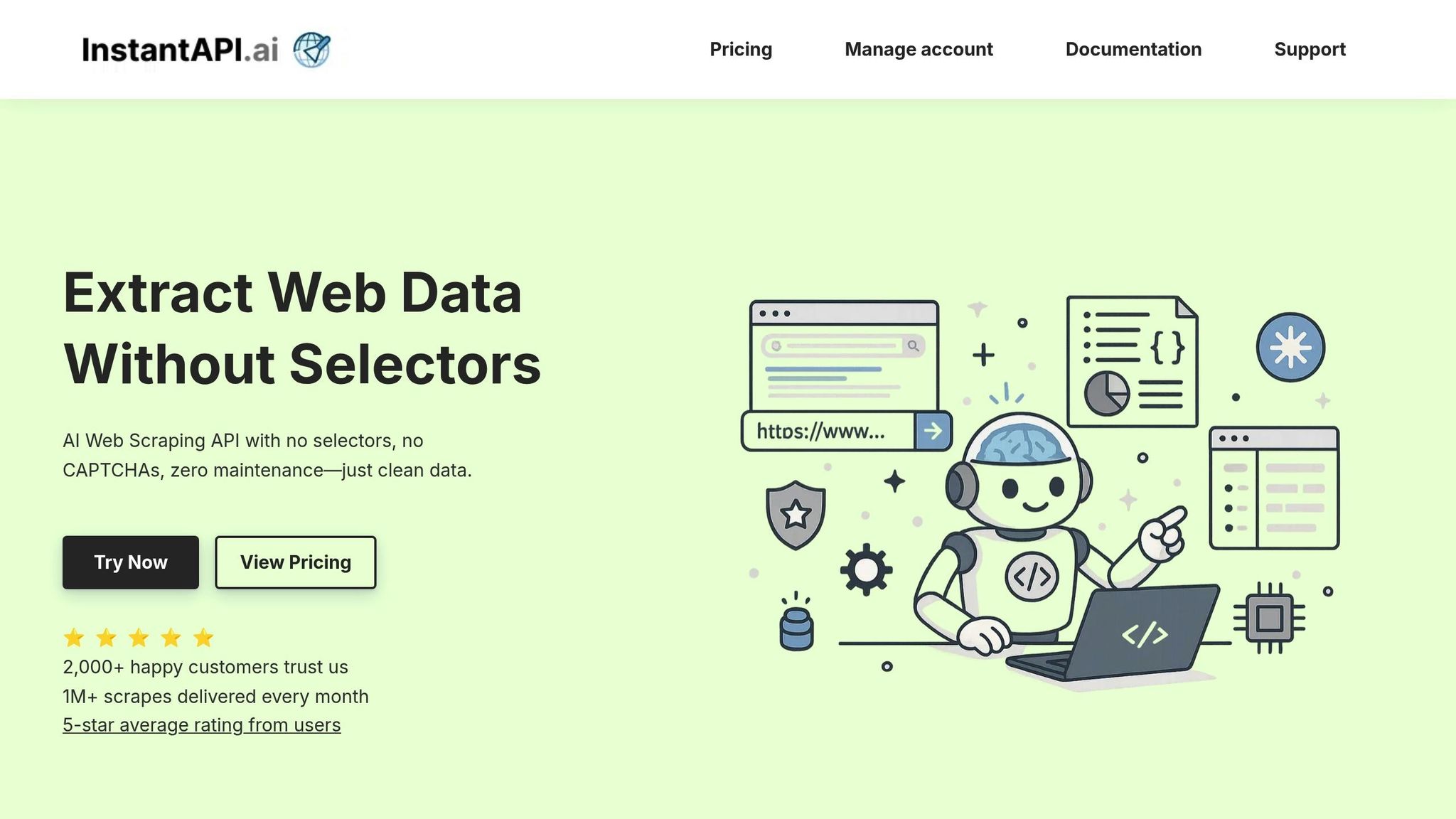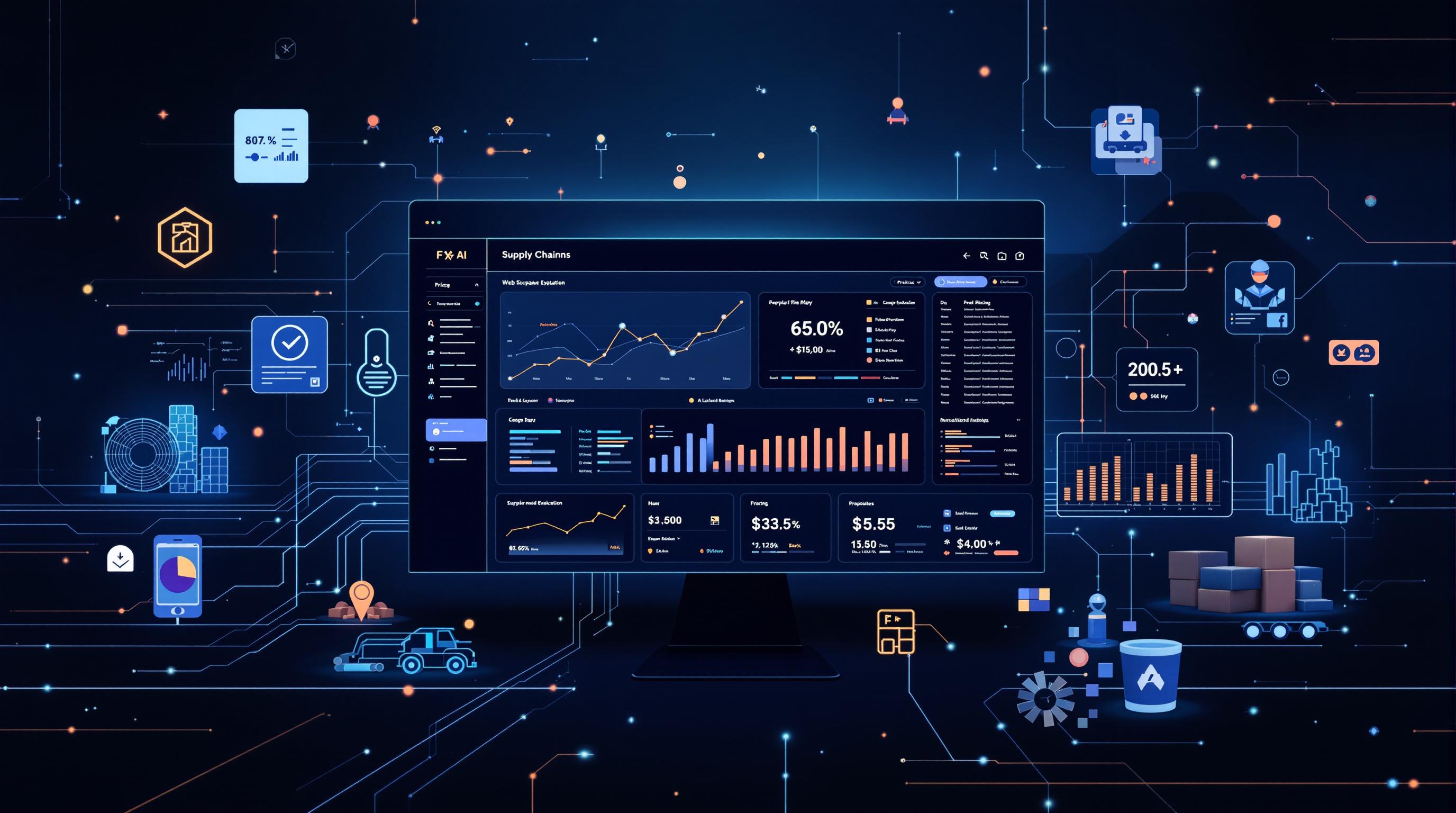Web scraping changes how we watch for event ticket sales and spots. Here's why it is big:
- New news all the time: See ticket costs, spots, and trends quick on sites like Ticketmaster and StubHub.
- Price watch: Costs can shift many times in one day. Scraping lets you keep up with these changes.
- Look at resale: Know the $8 billion resale game by tracking price moves and want ways.
- Plan events: Pull together facts like where it is, dates, and who will play to make smart choices.
- Do it easy: No need to look at many sites by hand. Scraping tools do the tough work, saving you time and work.
But, hard parts like CAPTCHA, heavy JavaScript sites, and often changing web pages make scraping hard. Tools like InstantAPI.ai make it easy by giving clean, set data at a low price, even when sites change how they look.
To do well, keep an eye on good data getting, stick to rules like robots.txt, and use strong tools to deal with fast-moving ticket sites. If you're watching prices or setting up events, web scraping is key in the quick world of ticketing.
How our Python bot found your baseball ticket (Valérie Ouellet)
Top Uses of Web Scraping for Event Tickets
Web scraping is now a key choice for looking at ticket data in real time, a huge deal in the fast world of event ticketing. As the event area makes a lot of price and seat data each day, scraping tech makes it easy to get this data from many places at once. This is how firms are using web scraping to stay on top in selling tickets.
Watching Ticket Numbers and Open Seats
It’s vital to watch ticket stock for a smooth flow. Look at Ticketmaster, dealing with huge numbers of tickets every year in many lands. The non-stop shifts in seat open spots and prices are way too much for manual watching. Yet, web scraping tools do this with no sweat. They keep an eye on open seats, ticket costs, and even price hikes on both main and side markets.
Event heads use this data to tweak prices and how they sell. For example, if another place is almost full, they might up their ticket costs to grab more buyers. Or, if lots of events still have many seats, they could drop prices or push ads to up sales.
Scraping also stops venues from selling too many or too few tickets. By showing how many seats are free across all platforms, scraped data makes sure stock counts are right. This cuts the chance of pricey mistakes and keeps things going smooth.
For live tracking, it's about watching key numbers. The best setups look at seat counts, price levels, and if seats are free often - maybe each few minutes when demand is high. Adding geo-data helps too, picking up area-based ticket data to sort local patterns, as ticket stock can change by place.
Once stock info is good, firms can look at price moves and second-hand selling.
Watching Price Turns and Resale Markets
With a resale market worth $8 billion, keeping an eye on price shifts is key for anyone in this field. Ticket prices can jump as much as plane fares, maybe changing many times in a day. For those who can watch and act fast, these shifts are big chances.
"Ticket price scraping offers a competitive advantage by providing real-time insights into price fluctuations and availability across major ticketing platforms." - Sandro Shubladze, CEO and Founder of Datamam
Pricing plans that shift often use pulled data. By putting this data into pricing tools, firms can change their ticket costs right away as the market shifts. For instance, if another firm drops its prices, auto systems can react fast, in just minutes, to keep up in the race.
"By automating data collection, companies can make faster, smarter decisions while staying ahead of market trends." - Sandro Shubladze, CEO and Founder of Datamam
Old info plays a big part in how prices are set. By looking at past trends, firms can guess when people will want more, see top times, and pick the best times for prices. This info helps firms make the most money while still being good at what they do.
Good price systems check many things at once: first prices, now prices, extra costs, and total costs for buyers. They also watch how fast prices change and how much certain events can shift, aiding firms in finding the best chances.
More than prices, event facts give extra key tips.
Getting Event Facts for Plans
Web scraping does more than just check prices and spots - it also pulls key facts about events that help plan and give direction. From event names and dates to place facts and who to call, this info is key for those who sell, plan, and study.
Place-specific facts are super good for looking at rivals. Scraped data can show how many can fit, open spots, and who to call to book. Event planners use this to pick the best spots, check size limits, and see how they stack up against others.
Looking at big sets of event info shows bigger trends. Firms can see which kinds of events are hot, which places fill up fast, and which price levels do best. These tips help guide big choices, from picking event kinds to making budgets.
The most key event facts include who will perform, age limits, parking choices, and how easy it is to get to. As event details might change, firms often check scraped data with the main sites to keep it right and useful.
Issues When Pulling Data from Ticket Sites
Pulling data from ticket sites can be a hard job. These sites work to stop bots, making it an expensive and often annoying task. Let's look at some big tech problems you might face.
JavaScript Use and Bot Blocks
Ticket sites use a lot of JavaScript and AJAX to show their data as you go. If your tool only reads the basic HTML, you'll miss key info. To deal with this, tools like Puppeteer, Selenium, or Playwright are used. They act like a real web user and get all the data. But, these tools use a lot of power, which can make the data pull slow and cost more.
Also, ticket sites have tough bot blocks, like CAPTCHAs, IP blocks, and systems that look for odd web use. Even with hidden browsers that look like real users, dodging these blocks is still a hard back-and-forth fight.
"Scraping JavaScript-heavy sites has always been a tricky challenge for me due to the dynamic content they generate. Unlike static HTML, the content on these sites often changes on the fly in response to user interactions or other events." - Rijad Maljanovic, Senior Software Engineer @ Memtime
These blocks get bigger when the sites change how they work and look often.
Site Code Changes and Weak Points
Sites that sell tickets change their code a lot. A tool that picks data well today may fail tomorrow if the site's design changes. CSS selectors, which help get data, can break easily. For instance, if a site changes how it shows prices, your tool's selectors might not work anymore.
To fight this, it's smart to have backup selectors and go for solid parts like data marks or IDs. This way makes tools that get data stronger and able to handle small changes without stopping fully.
"By creating resilient selectors, implementing proper error handling, and periodically reviewing your scraping code, you can minimize the impact of website changes on your scraping activities." - WebScraping.AI
Taking Care of Proxies and Web Browsers
Scraping big needs a strong proxy plan to stay hidden. Home, turning, and area proxies are key to act like a real user. But, running these proxies - and the no-screen browsers that pull active content - means always watching and fixing.
Session care makes it even harder. A lot of sites that sell tickets watch how users act, needing logins and checking browser marks (like screen size, plugins, or drawing style). To avoid being seen, you must deal with cookies, change user signs, and stay away from acts that may set off alarms.
A good watch system is vital to keep an eye on your proxies, browser work, and data worth. When problems pop up - and they will - fast finding and fixing are key to cut down not running times. Keeping this sort of setup often needs full-time DevOps help, making it a hard but needed cost for good data getting lines.
sbb-itb-f2fbbd7
Setting Up a Ticket Data Flow
To deal with issues such as bot attack and web page shifts, you need a good ticket data flow. A solid flow makes sure data is well collected, kept, and used without too much cost.
Making Your Data Set-Up
Begin by outlining the main parts your flow will cover: event name, place, date, ticket costs, seat areas, how many are left, cost levels, seller info, time mark, web link, and unique IDs. Use a nested JSON style, with event info at the start and lists for types of tickets and cost levels. Making sure things like money and dates are the same across your setup is key for regularity.
"Cleaning involves removing duplicates, correcting errors, and handling missing values. Normalization standardizes data formats and values, facilitating efficient storage and query performance. This step is crucial to ensure data quality and reliability." – Serdar Tafralı, Data Scientist
A good plan not just helps with auto work, but also makes sure it fits well with tools like InstantAPI.ai.
Using InstantAPI.ai for Easy Scraping

With InstantAPI.ai, you can get clean JSON from any ticket URL with no need for a manual setup. Just direct it at a ticket page, and it gives you structured JSON - no need to write your own code or run a web tool. At $2 for each 1,000 pages (and no monthly limits), it’s a smart pick for watching ticket info, even at busy times.
The /scrape point is very useful. It takes your JSON plan and pulls just the bits you want from ticket pages. For example, when a big star like Taylor Swift shares tour dates and ticket sites get busy, this tool works well with built-in proxy switches and CAPTCHA solving.
If you’re watching many events, the /links point can search for all ticket URLs on event pages. Just give easy English steps like "get event pages from this place", and it finds the links you need. For sites with many pages, the /next point smoothly moves through them, gathering data without you having to step in.
A top thing about InstantAPI.ai is it can adjust to layout changes on its own, cutting the need for fast fixes. This kind of auto work keeps your system up and running smoothly, even when things change when you least expect them.
Storing and Using Your Scraped Info
For instant updates, keep data in Redis, and for old data, use SQL or NoSQL bases. Tag fields like event day, place, and price range to make searches faster. SQL is great for deep searches - like looking for concerts under $50 in Chicago for the coming month or finding places with big price changes. Meanwhile, NoSQL choices like MongoDB work well for the not-so-organized nature of ticket info.
Your system should also be ready for high traffic. Ticket prices can change fast, mainly right after they start selling or as the event day comes close. A storage system that can deal with these jumps makes sure you don't miss key news.
Lastly, mix your system with tools for alerts or data study. For instance, set notices when prices reach set marks or send out daily snapshots for market study. The main aim is to use your scraped info for real actions, not just to keep it for later.
Data Rules and Law Musts
Keep Data Right and Fresh
In the fast world of ticket sales, right data is key. Ticket costs and spots can change fast, so having ways to find mistakes as they pop up is key.
Start with simple checks on your data. For example, if ticket costs for a big event are usually around $150 but you see a $5 cost, this could show a scrape mistake or site changes. Alerts that spot weird cost changes can help you see and fix such things fast.
How money looks is another key area. Make sure costs are all the same (like "US$125.00") to stop mix-ups or errors in your work. Even a small mistake in how money looks can mess up your cost math.
For keeping track of tickets, have ways to spot tickets that vanish in later scrapes. If you see a big drop in tickets, it might mean a tech issue with your scrape setup, needing a fast check.
Real-time checks can boost your data trust more. For instance, set your system to stop if it spots odd things like ticket cost spots showing venue names. Since ticket sites change their layouts often - mainly when many people visit - keep your check rules fresh all the time. Having clear time marks for your data can also help you see past trends, like price jumps before big events.
By putting strong data checks first, you not only make your insights better but also get ready to meet legal and fair rules.
Stick to Law and Fair Rules
While right data is key for fast choices, it's just as key to work within law and fair lines.
Start by looking at the website’s robots.txt file to know its data rules. Not following these rules might not make your actions wrong, but could look bad if legal trouble comes.
In the U.S., the Computer Fraud and Abuse Act (CFAA) is big in setting web scrape rules. Recent decisions, like the hiQ Labs vs. LinkedIn case (2017–2022), have made clear that scraping open data is not "unauthorized access" under the CFAA. Yet, breaking a site’s rules can still bring legal trouble, as seen in the X Corp vs. Bright Data case (2023).
To lower risks, use rate limits - pauses of 1 to 3 seconds between asks can stop overloading servers and cut chances of legal trouble. If your scraping touches personal data, hide it fast to keep privacy and cut risks.
Being open is another key thing. Keep clear notes on how you scrape, including rate limits and how you use data. This record might be very valuable if you need to show that your ways meet law and fair rules.
If you can, try to use the main APIs from ticket sites. These APIs may give you less data than scraping, but they cut down on legal danger. If you want to make a service for money with this data, talk to legal pros soon. Doing this can keep you safe from big problems later.
End: Making Ticket Work Better with Web Scraping
Web scraping frees us from the slow task of getting ticket info by hand. It speeds up the job and shares info fast. For example, in 2025, Expedia found that using web scraping to watch ticket costs could save travelers up to 25% by knowing the best times to buy. Also, Hopper saw that the price of airline tickets moves about 17 times per booking period, showing why it's key to keep up with cost changes.
The perks are clear: fast price checks, easy stock keeping, and quick spotting of new trends. By watching ticket numbers on many places at once, firms can move quick when the market shifts and get ahead of others.
Yet, there are hard parts. Old web scraping ways might break when site looks change. Plus, dealing with proxies, solving CAPTCHAs, and working with JavaScript can make the job tough. That's where tools like InstantAPI.ai help. Instead of taking weeks to make scrapers that may break, InstantAPI.ai gives clean data in one API call for just $2 per 1,000 pages, cutting down on set-up time and stress.
With such tools, the gain is easy to see. While some stick to slow, old ways or weak scrapers, you can use quick alerts for price cuts, fast stock info, and clear insights to stay in front.
To keep this lead, it's key to use strong scraping tools with good data checks and stay within the law. Doing things like following robots.txt rules and using rate limits keeps your work right and keeps it going strong. In the quick world of selling tickets, having sharp, fresh data isn't just nice - it's a must to keep up. By using top scraping tech with fair ways, you can keep your spot in the market for a long time.
FAQs
What should you think about in law when you use web scraping to check event ticket sales and how many there are?
In the United States, it's often okay to scrape web data if it's out there for everyone, as long as you don't break into sites or ignore the site's rules. But, taking private or locked data without the okay can bring big legal issues, like breaking deals, taking copyrighted stuff, or even doing fraud.
To stay clear of trouble, always read the terms of service of the site you want to scrape and be sure you follow them. If you're not sure of the law - especially with private or owned info - talking to a legal expert is a wise choice.


